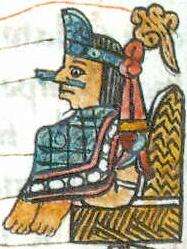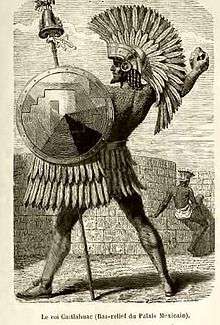Cuitláhuac
| Cuitláhuac | |
|---|---|
|
10th Tlatoani of Tenochtitlan Ruler of the Aztec Triple Alliance | |
 Cuitláhuac in the Primeros Memoriales. | |
| Reign |
2 Flint 1520 |
| Predecessor | Moctezuma II |
| Successor | Cuauhtémoc |
| Successor | Ixhuetzcatocatzin (Alonso) |
| Died | 2 Flint (1520) |
| Wife |
|
| Issue |
Ixhuetzcatocatzin (Alonso) Ana Luisa two others |
| Father | Axayacatl |
| Mother | A daughter of Cuitlahuac I |
Cuitláhuac (Spanish pronunciation: [kwiˈtɬawak]) (c. 1476 – 1520)[1] or Cuitláhuac (in Spanish orthography; Nahuatl: Cuitlāhuac,[2] Nahuatl pronunciation: [kʷiˈt͡ɬaːwak], honorific form Cuitlahuatzin) was the 10th tlatoani (ruler) of the Aztec city of Tenochtitlan for 80 days during the year Two Flint (1520).[3]
Biography
Early rule of Tenochtitlan
Cuitláhuac was the eleventh son of the ruler Axayacatl and a younger brother of Moctezuma II, the previous ruler of Tenochtitlan.[4] His mother's father, also called Cuitlahuac, had been ruler of Iztapalapa,[5] and the younger Cuitláhuac also ruled there initially.[6]
Conflict with Spain
Cuitláhuac was made tlatoani of Tenochtitlan during the Spanish conquest of Mexico; After Pedro de Alvarado had ordered the Massacre in the Great Temple, the Aztecs were very upset and started to fight and put a siege to the Spaniards. Hernán Cortés ordered Moctezuma to ask his people to stop fighting. Moctezuma told him that they would not listen to him and suggested Cortés free Cuitláhuac so that he could convince them to dispose of their arms and not fight anymore. Cortés then freed Cuitláhuac and once Cuitláhuac was free he led his people against the conquistadors. He succeeded and the Spaniards were driven out of Tenochtitlan on June 30, 1520. Cuitláhuac was ritually married to Moctezuma's eldest daughter, a ten- or eleven-year-old girl who later was called Isabel Moctezuma.[7]
Final rule

After having ruled for just 80 days, Cuitláhuac died of smallpox[3] that had been introduced to the New World by the Europeans. His elder brother Matlatzincatzin, who had been cihuacoatl ("president"), resigned upon Cuitláhuac's death.[8] As soon as Cuitláhuac died, Cuauhtémoc was made the next tlatoani.[3]
Legacy
The modern Mexican municipality of Cuitláhuac, Veracruz and the Mexico City Metro station Metro Cuitláhuac are named in honor of Cuitláhuac. The asteroid 2275 Cuitláhuac is also named after this ruler.
There is an Avenue in Mexico City Called Cuitláhuac (Eje 3 Norte) that runs from Avenue Insurgentes to Avenue Mexico-Tacuba and that is part of an inner ring; also many streets in other towns and villages in Mexico are so called.
See also
Notes
- ↑ For year of birth, see entry for "CUITLAHUAC", Dictionnaire de la langue nahuatl classique (Wimmer 2006).
- ↑ Wimmer (2006).
- 1 2 3 Chimalpahin (1997): pp. 56–57, 164–165, 216–217.
- ↑ Chimalpahin (1997): pp. 148–151.
- ↑ Chimalpahin (1997): pp. 42–43.
- ↑ Chimalpahin (1997): pp. 50–51.
- ↑ Chipman, Donald E. (2005). Moctezuma's Children: Aztec Royalty Under Spanish Rule, 1520–1700. Austin: University of Texas Press, pp. 40-41 ISBN 0-292-70628-6. OCLC 5713428
- ↑ Probably from Chimalpahin (1997); broken reference.
References
- Chimalpahin Quauhtlehuanitzin, Domingo de San Antón Muñón (1997) [c.1621]. Codex Chimalpahin, vol. 1: society and politics in Mexico Tenochtitlan, Tlatelolco, Texcoco, Culhuacan, and other Nahua altepetl in central Mexico; the Nahuatl and Spanish annals and accounts collected and recorded by don Domingo de San Antón Muñón Chimalpahin Quauhtlehuanitzin. Civilization of the American Indian series. Arthur J.O. Anderson and Susan Schroeder (eds. and trans.), Susan Schroeder (general ed.), Wayne Ruwet (manuscript ed.). Norman: University of Oklahoma Press. ISBN 978-0-8061-2921-1. OCLC 36017075.
- Wimmer, Alexis (2006). "Dictionnaire de la langue nahuatl classique" (online version, incorporating reproductions from Dictionnaire de la langue nahuatl ou mexicaine [1885], by Rémi Siméon). Retrieved 2010-09-15. (French) (Nahuatl)
External links
| Wikimedia Commons has media related to Cuitláhuac. |
| Preceded by ? |
Tlatoani of Itztapalapan | Succeeded by Ixhuetzcatocatzin |
| Preceded by Moctezuma II |
Tlatoani of Tenochtitlan 1520 |
Succeeded by Cuauhtémoc |